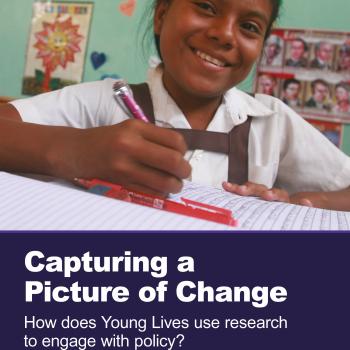
This booklet gives an overview of how Young Lives uses research to engage with national and international debates and policies on child poverty. And it gives concrete examples of how our research is used for this purpose.
Research evidence informs policy thinking and processes in a number of ways. It generates new knowledge, but it can also add nuance to analysis. Data can both confirm what we know (ensuring that decisions are based on solid evidence) and challenge long-held assumptions about children’s lives and their place in the family or their role in a community. Researchers have an important role in working with policymakers to make the case for evidence-informed policymaking and in building the case for gathering better data. They also have a role to play in improving the knowledge and understanding of policymakers or organisations.
The policy process is messy and often unpredictable. It is a complex system in which the same piece of evidence can have no effect, or a major one, depending on the timeliness of an idea and the politics of place. A specific piece of research can be used to influence a policy or programme, but research can also influence the way people think about an issue.
Young Lives focuses on fostering trust, building relationships, and developing policy-relevant questions to frame our analysis. This takes time, and sometimes policy ‘successes’ are serendipitous or attribution is difficult. For this reason Young Lives has invested long-term in working with networks and alliances in our study countries and internationally, sharing our data with other researchers and policy organisations, and using the media and other channels to raise awareness in order to keep child poverty firmly on the policy agenda.

This booklet gives an overview of how Young Lives uses research to engage with national and international debates and policies on child poverty. And it gives concrete examples of how our research is used for this purpose.
Research evidence informs policy thinking and processes in a number of ways. It generates new knowledge, but it can also add nuance to analysis. Data can both confirm what we know (ensuring that decisions are based on solid evidence) and challenge long-held assumptions about children’s lives and their place in the family or their role in a community. Researchers have an important role in working with policymakers to make the case for evidence-informed policymaking and in building the case for gathering better data. They also have a role to play in improving the knowledge and understanding of policymakers or organisations.
The policy process is messy and often unpredictable. It is a complex system in which the same piece of evidence can have no effect, or a major one, depending on the timeliness of an idea and the politics of place. A specific piece of research can be used to influence a policy or programme, but research can also influence the way people think about an issue.
Young Lives focuses on fostering trust, building relationships, and developing policy-relevant questions to frame our analysis. This takes time, and sometimes policy ‘successes’ are serendipitous or attribution is difficult. For this reason Young Lives has invested long-term in working with networks and alliances in our study countries and internationally, sharing our data with other researchers and policy organisations, and using the media and other channels to raise awareness in order to keep child poverty firmly on the policy agenda.

